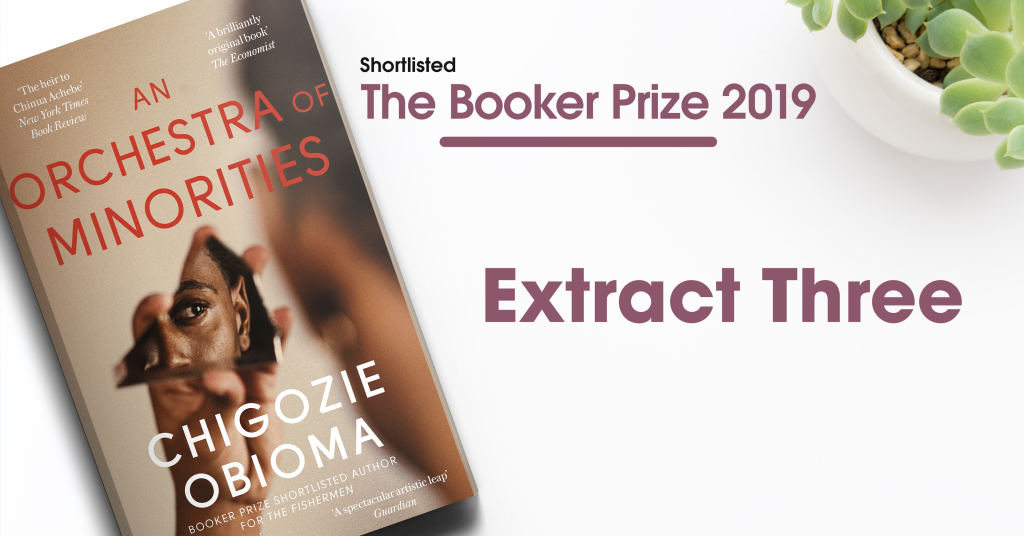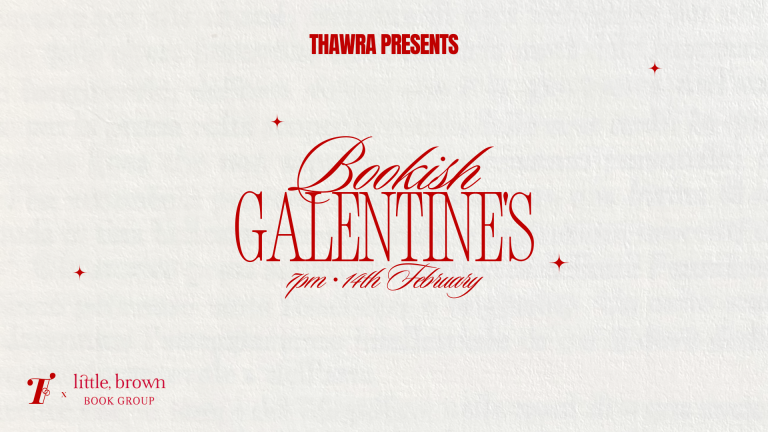An Orchestra of Minorities: Extract #3

AKWAAKWURU, even with the thoughts I put in his head that she loves him, he was still afraid. I could not tell him what I had done. A chi cannot communicate with its host in such a direct way. The human would not understand even if we did. We can only flash thoughts in their minds, and if a host finds these reasonable, he may believe them. So I watched helplessly as he went about with an increased palpitation, fearing that, like Motu, she will be gone again. For days he paid curious attention to his phone, waiting for her to call. Then, on the fourth day, while he was sleeping on his sofa in the sitting room, he heard a car drive into his compound down towards his house. It was after sunset, and the shadows that had sprouted at the height of the day had already become old. When he looked through the window, he saw Ndali’s car pulling to a stop. He cried, ‘Chukwu!’ He had eaten lunch not too long before, and the plastic bowl sat on the stool beside him, still containing water in which a small empty bag that had contained groundnuts and a plastic sachet of Cowbell powdered milk were floating. He dropped the bowl in the kitchen sink. Then he ran to his room and put on the trousers that lay on the bed. He glanced quickly in the mirror on the wall of his room, grateful that Sunday had finally cut his hair two days earlier. When he rushed back into the sitting room, his eyes fell on the blue box of sugar cubes that sat half closed on the centre table, beside a globular stain. And at the foot of the table, on the plastic bag containing thread, needles and a small sack of nails. She was knocking while he took these away. He returned again a moment later and looked about the house to see if there was anything he could clean, and when he did not see anything whose oddity he could very quickly fix, he ran to the door, still holding on to his chest to stabilise the heartbeat. Then he opened the door.
‘How did you find me?’ he said once she came in. ‘Do you live on the moon, er, mister- man?’ ‘No, but Mommy, how? It is hidden, and the numbers are not even clear sef.’
She shook her head, wearing a gentle smile. Then she said his name with a slow, dragging enunciation, the way a child learning to speak might say it, No- n- so.
‘Would you give me a seat?’
He threw his eyes about the room again and nodded. She sat on the big sofa near the window while he stood transfixed at the door. Then, almost at once, she rose and began walking about the sitting room. As she did, he became worried that she would perceive the smell that hung in the air. He observed her nose for any sign of her scrunching it or covering it. He noticed then, with even greater alarm, that there was a clearly perceptible stain on the wall. He feared it might be chicken shit. He went and stood in front of the stain, wearing a smile that concealed his distress.
‘You live alone, Nonso?’
‘Yes, I live here alone. Only me. My sister doesn’t come, except my uncle who comes sometimes,’ he said with haste.
Her nod did not translate into attention, for as he spoke, she stepped into the kitchen. The state of the kitchen made his heart sink. The arches around four sides of the ceiling had cobwebs that were blackened with soot, making it look as though spiders nestled in them. The sink was full of dirty plates, on one of which was a sponge hewn from a plaited- thread sack, a shrivelled green piece of soap trapped in its netting. Even more shameful to him was something he was not immediately responsible for: the tap on the sink. It had long atrophied into disuse, and its head had been removed and simply replaced with a piece of a black polythene bag. His kerosene stove, too, was dirty. It sat on a blackened slab of wood. It wore the singed skin of the chicken he’d roasted on its top levers, and around its top perimeter were grains of dried rice and what looked like a dried tomato skin. Even worse, at the far corner, behind the door that led to the yard, was a dustbin full of rubbish from which a putrid smell simmered.
Egbunu, he would have died if she’d lingered in the kitchen for a moment more after she turned on the light and roused the thread of flies gathered around the stack of unwashed plates. He was relieved when he saw the net door open slightly and its spring give way, creaking as it opened into the backyard.
‘You have many chickens!’ she said. He walked up to her. She had one leg on the threshold, the other in the yard. She leaned back into the kitchen towards him. ‘You have many chickens,’ she repeated, as if in surprise.
‘Yes, I’m a poultry farmer.’
‘Wow,’ she said. She stepped out into the yard, staring wide- eyed at the coops. Then, without saying a word, she returned to the sitting room and sat back on the sofa beside her purse. He followed her and caught a glimpse of her underpants as she sat down, briefly spreading her legs. He joined her, frightened because of the things she had seen. She did not speak for a while but kept looking at him in a way that so discomforted him that he wanted to ask her if she despised him because of the state of his house, but the words lay loaded in his mouth like a fodder in a cannon, awaiting the signal to fire. To prevent her from looking around the house again, he sought to engage her in conversation.
‘What happened to you that night?’ he said. ‘I was going to die,’ she said and dropped her eyes to the floor.
Her words softened his shame.
‘Why?’
Without hesitation, she told him she’d woken up the morning of the day before to find the world she’d so carefully built crumpled into dusty ruins. She had been crushed for two whole days by an e- mail from her betrothed, which had announced that he had married a British woman. The blow, she told him, was unbearable because she had given that man five years of her life, gathered all her savings, and even stolen from her father to help him achieve his dream of getting a degree in film directing from a school in London. But barely five months into this move to Britain, he was married. With a voice filled with so much pain my host could feel it, she explained how nothing had prepared her for the blow she felt.
‘Nothing to hold on to, nothing to even – nothing. Throughout that day before I saw you on that bridge, I was tired because I had tried, tried, tried to reach him, but nothing, Nonso.’ She had gone to the river not because she had any strength or will to kill herself but because the river was all she could think of after reading the e- mail for the umpteenth time. She did not know whether she would have jumped off the bridge if he had not come.
My host listened with a keen ear to her story, only speaking once – to ask her to ignore the chickens that had begun to squawk plaintively.
‘What happened to you is very painful,’ he said, although he’d not understood all of it. Her command of the White Man’s language contained more words than he could comprehend. His mind had hovered, for instance, over the word circumstances like a kite over a gathering of hen and chicks, unable to decide how or which to attack. But I understood everything she said, because every cycle of a chi’s existence is an education in which a chi acquires the minds and wisdom of its hosts, and these become part of the chi. A chi may come to know, for instance, the intricacies of the art of hunting because once, hundreds of years before, the chi inhabited a host who was a hunter. In my last cycle, I guided an extraordinarily gifted man who read books and wrote stories, Ezike Nkeoye, who was the older brother of the mother of my present host. By the time he was my current host’s age, he’d come to be familiar with almost every word in the language of the White Man. And it was from him that I acquired much of what I now know. And even now, as I testify on behalf of my current host, I wear his words as well as mine and see things through his eyes as well as mine, and both sometimes meld into an indistinguishable whole.
‘It is very painful. I am talking like this because I have suffered too much also. I no have father and mother. In fact, no family.’
‘Ah! That is very sad,’ she said, putting her hand over her wide- open mouth. ‘I am sorry. Very sorry.’
‘No, no, no, I am now fine. I am fine,’ he said, even though the voice of his conscience was tugging at him for having left out his sister, Nkiru. He watched Ndali rest her weight on her thigh and tilt her body towards the small table centred between them. Her eyes were closed, and this made him think that she was sinking into pity for him, and he feared that she might cry for him.
‘I am fine now, Mommy,’ he said even more resolutely. ‘I have a sister, but she is in Lagos.’
‘Oh, junior or senior sister?’
‘Junior,’ he said.
‘Okay, why I have come is because I have come to thank you.’ A smile washed across her tearful face as she pulled her bag up from the floor.
‘I believe God sent you to me.’
‘Okay, Mommy,’ he said.
‘What’s this “Mommy” you keep saying? Why do you say it?’
Her laughter now made him conscious of his own feral laughing, which he’d tried to contain to avoid embarrassing himself.
‘Really, it is strange oh!’
‘I don’t have a mother again, so every good woman is my mommy.’
‘Oh, so sorry, my dear!’
‘Am coming,’ he said and went to the toilet to urinate. When he returned, she said, ‘Did I forget to say that I love your laugh?’
He looked at her. ‘I do. Seriously. You’re a beautiful man.’
He nodded hastily as she rose to leave and let his heart take temporary flight at this extremely unexpected outcome of what he had been certain would be a disaster.
‘I have not even offered you something.’
‘No, no, don’t worry,’ she said. ‘Another time. I have tests.’ He thrust his hand out to shake hers, and she took it, her face wide with smiles.
‘Thank you.’
Guardian spirits of mankind, have we thought about the powers that passion creates in a human being? Have we considered why a man could run through a field of fire to get to a woman he loves? Have we thought about the impact of sex on the body of lovers? Have we considered the symmetry of its power? Have we considered what poetry incites in their souls, and the impress of endearments on a softened heart? Have we contemplated the physiognomy of love – how some relationships are stillborn, some are retarded and do not grow, and some fledge into adults and last through the lifetime of the lovers?
I have given much thought to these things and know that when a man loves a woman he is changed by it. Although she willingly gives herself to him, once he marries her she becomes his. The woman becomes his possession, and he becomes her possession. The man calls her Nwuyem, and she calls him Dim. Others speak of her as his wife and of him as her husband. It is a mystifying thing, Egbunu! For I have seen many times that people, after their beloveds have left them, try to reclaim them as one would attempt to reclaim property that had been stolen. Wasn’t this the case with Emejuiwe, who, one hundred and thirty years ago, killed the man who took his wife from him? Chukwu, when you laid down your judgment after my testimony on his behalf here in Beigwe, as I am doing now, it was sad but just. Now, more than a hundred years later, when I saw my current host’s heart lit with similar fire, I feared because I knew the potency of that fire, that it was powerful, so powerful that in time nothing might be able to quench it. As he walked her to her car, I feared it would push him in a direction in which I might be powerless to stop him from going. I feared that when the love had fully formed in his heart, it would blind him and make him deaf to my counsel. And I could see already that it had started to possess him.
Shortlisted for the Booker Prize 2019, An Orchestra of Minorities is a heart-wrenching epic about the tension between fate and free well.






